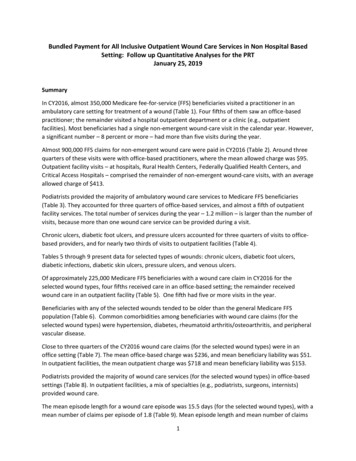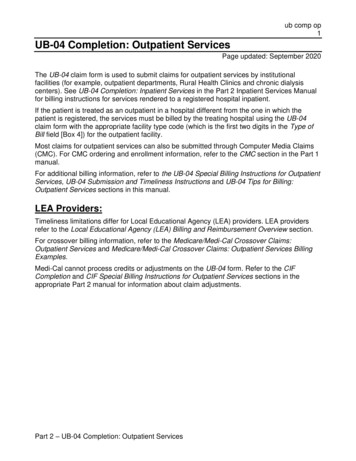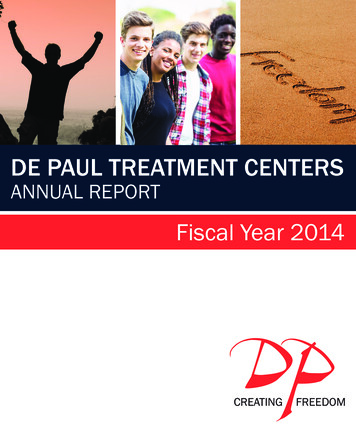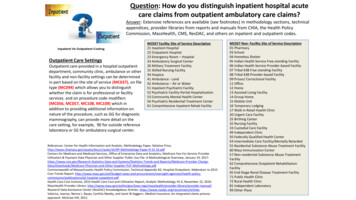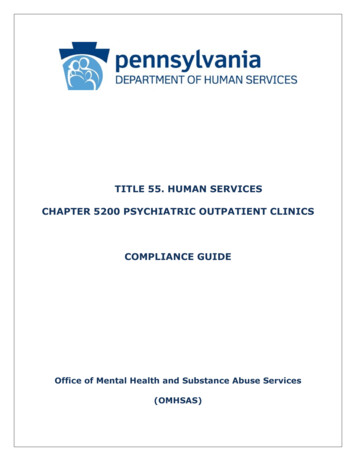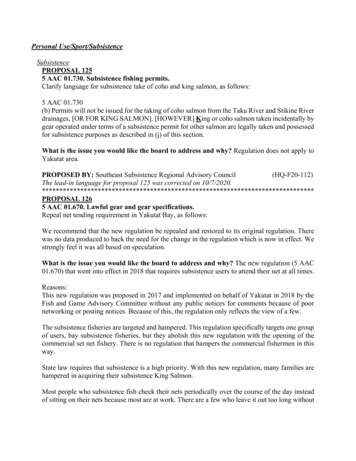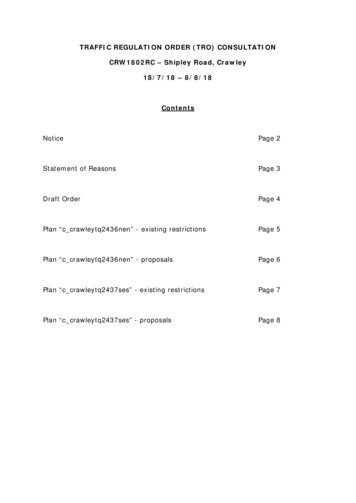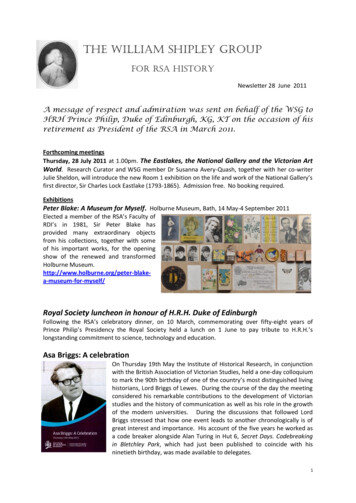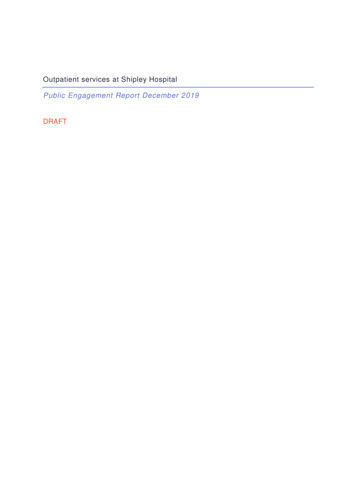
Transcription
Outpatient services at Shipley HospitalPublic Engagement Report December 2019DRAFT
ContentsBackground. 3Approach . 4Engagement findings . 5Summary of key findings: . 5Section1: People with recent experience of outpatient services . 6Travelling to use outpatient services . 7Patient experience . 9Choice . 11Section 2: People who have not used outpatient services in the last year . 12Awareness of services at Shipley Hospital . 12Previous experience of Shipley Hospital . 12Section 3: Changes to outpatient services . 14What matters most . 14What impact would changes have . 16Options to be considered . 18Decision making. 19Other concerns . 21Section 4: Future consultation . 222
BackgroundShipley Hospital – the buildingBuilt over 100 years ago, Shipley Hospital (at 98 Kirkgate, Shipley BD18 3LT) is a largeconverted house. Over time, it was a maternity home and a community hospital. Today,outpatient services and a support group occupy the ground floor. The first floor inpatientward was closed in May 2010 because of significant fire safety issues.Whilst it is safe to provide services to patients on the ground floor, the building continuesto pose issues for staff and patients due to its age and condition. Frequently there areissues with the roof and the fabric of the building, for example. Sadly, the age andstructure of the building mean it is not possible to improve the standard to that of amodern, purpose-built, health facility. This is why we are considering the future of theservices at the hospital. If these move to other locations, the hospital could be closedand proceeds from its sale returned to the NHS.Services at Shipley HospitalNHS services include physiotherapy (five days) and occupational therapy (four halfdays), x-ray (four mornings), and outpatient clinics (one half day a week) for generalsurgery and memory assessment, and two half day sessions for older people’spsychiatry. Bradford Bereavement Support also provides a counselling service (twodays).Purpose of engagementFollowing a request by Bradford Teaching Hospitals Foundation Trust to relocateRadiology services to St Luke’s Hospital, the CCGs and the Trust have worked with NHSProperty Services to review the current utilisation of the site.To help inform our decision about the future of Shipley Hospital and its services, we needto understand the views of local people on options for future service delivery. A period ofengagement was planned to inform further development of options for the future ofservices, in order to: collect further insight into how people currently use services and awareness ofthese services within the community;gather insight about potential future options which should be explored in moredetail prior to formal consultation; understand who is most likely to be impacted by the proposals, and how; understand what is important to people, and why; understand how local people want to take part in a future consultation.Detailed Quality and Equality impacts have been carried out and will continue to beupdated to take into account new information, including the insight fromengagement. The engagement report will inform the formal consultation withpatients, the public, our partners and wider stakeholders.3
ApproachThe CCG worked with stakeholders to develop a communications and engagementplan that was proportionate to the intended change and enabled a wide range ofpeople to participate.Engagement period:Before the engagement launched, we discussed our plans and gathered views frompatient and carer representative organisations: Healthwatch Bradford and DistrictNHS Bradford district and Craven People’s BoardEngaging People partners, BTM, CNet, HALEOur Engaging People partners have strong community links in the local area, andwere well placed to lead on this engagement, in order to actively promote it in thelocal area and gather responses.An engagement document (Appendix 1) was developed which included informationabout services at Shipley Hospital and a questionnaire. This was available tocomplete online and printed copies were also produced and distributed.Engaging People attended community settings such as GP practices, libraries andleisure facilities to talk face to face and gather people’s views. They also attendedseveral sessions at Shipley Hospital to gather views of people currently accessingservices. Posters were produced advertising details of when and where EngagingPeople teams were attending. Appendix 2 contains a full list of locations covered.The survey was also promoted through sending information out to our existingcontacts, and our voluntary sector partners also included information in theirnewsletters, e-bulletins etc.The survey was promoted on Bradford District CCG’s website. Regular posts wereplanned on social media throughout the engagement period, however after theengagement had launched we were advised by NHS England to cease promotion ofthe survey and engagement activities during the general election campaign period.Press releases were not issued to local media due to pre-election restrictions.However information about the engagement was picked up from other sources andappeared in the Telegraph and Argus newspaper and website on 6 November 2019.454 individual responses were collected.4
Engagement findingsOur engagement activity focused on reaching people most likely to be affected byany changes to outpatient services at Shipley hospital, so targeted Shipley and thesurrounding areas in line with the usage data provided for current services.The engagement team from our VCS partners held several sessions in ShipleyHospital itself in order to reach people most likely to be affected, therefore a higherproportion of respondents have recent experience of outpatient services that wouldbe expected in the general population.Summary of key findings: Most people in the local area were aware of the services provided at ShipleyHospitalAround 70% of people had some experience of Shipley HospitalOver half of other respondents said their experience of Shipley Hospital waslonger than three years ago, with almost a third of respondents describingexperiences longer than ten years agoOver half of people with recent experience of outpatient services had driven toaccess these servicesPeople’s feedback about their experience of outpatient services was mostlypositive, particularly around the attitude of staff working in these servicesWhen it comes to the future of outpatient services, almost a third of people talkedabout the importance of keeping outpatient services in the local area, in order tomeet the needs of local peoplePeople also raised concerns about travel times, access to public transport andproblems with parking at the main Bradford hospital sitesThree quarters of people felt that we should explore the option to repair thebuilding and retain services at Shipley HospitalAround half of people wanted to explore the option of moving services into localGP surgeriesPeople wanted to be assured that local views and the impact on patients wouldbe taken into account when making decisions.“I was born in Shipley hospital and to see it close would be so sad. Our elderlypeople rely on a local hospital, refer to a local hospital. The amount of peoplewho rely on patient transport but complain of the waiting times [.] KeepingShipley open offers more services and would cut down on this”“If all the services were still going to be offered locally, I would be inagreement with the decision to close the hospital. People living in Shipley,Baildon, Bingley, Esholt, Eldwick, Gilstead don’t want to trail to Bradford. Itwould put pressure on hospital patient transfer service.”5
Section1: People with recent experience of outpatient servicesPeople were asked whether they had experience of outpatient services in the pastyear; 419 people answered this question and the majority of them indicated that theyhad used one or more service in the last year, 328 people (78% of respondents) saidthat they had used a service.Radiology (x-rays) has the highest reported usage, with 237 people having accessedradiology (56%), 174 people accessing physiotherapy (42%) and 113 people hadexperience of general surgery outpatients (27%). Other outpatient services which weasked about had much lower numbers of people reporting direct experience: olderpeople’s mental health or memory clinics, 22 people (5%); occupational therapy, 17people (4%); bereavement support services, 14 people (3%). Some people indicatedthat they had used more than one service.If people indicated that they had used these services, they were asked to say wherethey had gone for these services. 272 people answered this question.Overall the most common response was Shipley Hospital, with 150 having accessedservices there in the last year (55% of people who recently used services or 33% ofall respondents). Many people had accessed services at more than one location.Q2 Where did you go to use these servicesShipley Hospital150Bradford Royal Infirmary81St Luke's Hospital52Other*23GP practice22Yorkshire Clinic17Airedale Hospital7Eccleshill66
*Within ‘other’, people’s answers included services out of the area (most often inLeeds or Calderdale) and private physiotherapy services.Service location breakdownIt is not possible from the data collected to determine exactly which service wasaccessed at each location, as many people indicated multiple services and locations,however we can see some trends and variation depending on which services peoplehad used.People who had used radiology (x-rays) were equally likely to have accessedservices at either Shipley Hospital (114 people) or at one of the Bradford hospitalsites (115 people in total at BRI & St Luke’s). A smaller number of people alsoreported attending Yorkshire Clinic (12) or Airedale hospital (5).People who had accessed physiotherapy were most likely to have attended ShipleyHospital with fewer people attending Bradford hospital sites (94 at Shipley Hospital,38 at BRI and 26 at St Luke’s).People who had used physiotherapy were also most likely to have reportedaccessing outpatient services at their own GP practice (three quarters of people whoreported accessing services at GP practices had used physiotherapy).Most people with experience of general surgery outpatient clinics reported that theyhad attended Bradford Royal Infirmary (46 people) or St Luke’s Hospital (28 people),rather than Shipley Hospital (24) or Yorkshire Clinic (11).Only a small number of people reported having accessed Eccleshill, all of whom saidthey had used radiology services.Travelling to use outpatient servicesPeople were asked to tell us how they had travelled to access the outpatient servicesthey had used in the last year. Over half of people had driven, and a quarter hadused public transport.All responses7
Filtered for people who used Shipley HospitalFiltered for people who used any other locationThere is slight variation in the most common travel methods between people whoreport accessing services at Shipley Hospital or in other locations; people seem tobe more likely to walk or cycle to Shipley Hospital than to other sites, which is to beexpected given that it is closer to home for most respondents to this survey. Morepeople reported travelling by taxi or public transport to services beyond the Shipleyarea. However the proportion of people driving to access services is consistentregardless of the location, varying only very slightly.8
Patient experiencePeople were asked to briefly describe their experience of the outpatient services theyhad used in the last year. 298 wrote an open text response to this question, althoughmany comments were very brief (e.g. ‘fine’ ‘ok’ ‘good’).As many respondents indicated that they had used more than one service andattended different locations, it is not possible to draw clear conclusions aboutvariations in experience between services/locations, however some themes haveemerged.Overwhelmingly, most comments about services were positive. 208 (70%) of thecomments were analysed as positive, and only 20 (7%) as negative. The remainingfeedback was either neutral (showing neither negative nor positive sentiments) ormixed (showing both positive and negative sentiments).173 comments contained enough detail to be categorised by theme as well assentiment. The most commonly occurring theme was staff attitude, followed bywaiting times.% total comments whichrelate to this theme% comments in this themewhich are positiveStaff attitude30%78%Waiting times18%35%Location13%80%Parking10%14%Size of hospital6%33%Transport5%29%Quality of treatment5%29%Cleanliness &environment4%71%Communication &information3%60%Theme9
Staff attitudeAlmost a third of the comments were about the staff working in their services, andover three quarters of this feedback was positive.“Very positive, encouraging and supportive staff.”“Excellent service, really well looked after by all the staff.”“The staff help me a lot as I have bad mobility. They are very nice.”“All the staff friendly and helpful, also made you feel comfortable.”People shared positive feedback about the caring and helpful attitude of staffmembers across all the outpatient services and locations. There was very littlenegative feedback related to staff attitude, but some was categorised as mixedwhere comments contained both positive and negative sentiment.“All staff 100%. Just the system is overloaded.”“Good helpful staff but I struggle with English, not always having interpreters.”Waiting timesMany people mentioned waiting times in their comments about their experience ofoutpatient services. On the whole, comments from people with experience ofservices at Shipley Hospital were more positive about waiting times than those whohad accessed BRI or St Luke’s. People commented mostly about the time spentwaiting on the day of their appointment, rather than referring to waiting lists or delaysin accessing a service.“The service was brilliant. Prompt and no waiting time at the time of theappointments - got seen either dead on time or within 3 minutes of theappointment time.”“I always got in on time for my appointment.”“Very quick and prompt unlike BRI or St Luke’s which are already overworked.”Location, Transport & ParkingThere were a large number of comments about the convenient location of services atShipley Hospital for people who live in the local area.“It was great because it was local, I could park on a side street & it was quick,no waiting around.”“It was extremely convenient to be able to go to a local hospital.”By contrast, many people with experience of other hospital sites describedchallenges with transport, and in particular parking.“Car parking is difficult at St Luke’s and BRI expensive.”10
“Bus issues, struggle to get back as bus services stop at 5pm. Had 5 appointment and really struggled to get to BRI & St Luke’s.”A small number of people commented specifically on challenges for disabled peopleaccessing the main hospital sites.“Journey parking difficult, frustrating, disability poor mobility.”“Difficult to get to by bus. Struggle with mobility and far too busy.”Size of hospitalSeveral people’s comments were about the comparative size of Shipley Hospitalopposed to other sites such as BRI or St Luke’s. Some people said that ShipleyHospital felt more comfortable because it is a smaller and quieter setting.“Over the years I have used the services at this hospital as have my family.We have always felt it offers a more personal service, in a smallerenvironment than a larger hospital.”Other themesThere were only small number of comments relating to quality of treatment,cleanliness and environment, or communication and information. These commentsrelated to individual experiences across a range of services and there were no clearthemes. All comments received will be fed into our Grassroots database of patientexperience and also shared with the providers to help shape future improvements.ChoiceWe asked people whether they had been offered a choice about where to accessoutpatient services. Around half of them answered that they had not been offered achoice.This proportion varies between people who accessed services at Shipley Hospital,rather than those who accessed services at other locations. Over half of people whohad used Shipley Hospital were more likely to say that they had been offered achoice (55%), against around a third of people who had used other locations (32%).11
Section 2: People who have not used outpatient services in the last yearAwareness of services at Shipley HospitalPeople were asked which services they were aware of at Shipley Hospital, as ourVCS engagement partners had suggested that many local people were not aware.From 454 respondents, 336 people selected one or more service, 102 peopleselected none of the options and 16 people wrote a specific comment to say thatthey were not aware of any outpatient services at Shipley Hospital.“None, thought Shipley hospital wasn't in use.” “Never heard of it.”The services that people were most likely to be aware of are radiology andphysiotherapy.Previous experience of Shipley HospitalIn addition to the questions about people’s direct experience of outpatient services,we asked a broader question to those who hadn’t used services recently, aboutwhether they had ever experienced care at Shipley Hospital itself. 402 peopleanswered this question, with 288 people responding positively.N.B. 114 people had used services within the last year; insight about theirexperience has been covered in the earlier section.12
Over half of other respondents said their experience of Shipley Hospital was longerthan three years ago, with almost a third of respondents describing experienceslonger than ten years ago.We asked these people what they had attended Shipley Hospital for, and theresponses follow a similar pattern to those with more recent experience of outpatientservices; radiology and physiotherapy are the most common services used. Howeveraround a fifth of people described accessing Shipley Hospital for other services?37 people who selected ‘other’ wrote a comment; however 11 of these commentsdid not specify what service they had accessed. The services listed in people’sanswers have been grouped into categories:Diabetes clinic4Dental3Respite care4Maternity3MSK4Acupuncture2Out of hours GP4Palliative care213
Section 3: Changes to outpatient servicesThe engagement document explained that Local NHS organisations are exploringoptions for the future of services which are currently provided at Shipley Hospital,prior to any decisions being made or formal consultation process.What matters mostWe asked people to think about what would be most important things to considerwhen thinking about the future of outpatient services. 349 people provided aresponse to this question, and these comments have categorised by theme.Keeping services localOlder peopleConvenienceTravelling/transport5%29%6%List of servicesParkingKeep Shipley Hospital openPressure on other services10%Support closure of Shipley HospitalNeeds of patients14%12%Retaining staffWaiting times13%Cost of repairSpecific needs (disability)Awareness of servicesAlmost a third of people talked about the importance of keeping outpatient servicesin the local area, in order to meet the needs of local people.“Local facilities for local people, the ease of getting there is half the battle.”“Local service for people living in this area. Convenient.”“Making sure that all services are provided locally.”“Local services are always more convenient for the elderly to get to.”People talked in particular about the needs of older people. They emphasised theimportance of taking into account the difficulties that elderly, frail or disabled peoplemight face in accessing services further away.“Ease for patients, especially the elderly & frail.”“Better to stay local so elderly have less to travel.”“Majority of people in Shipley are elderly, going to other places would be atrek for them.”“Services for the elderly and disabled, who cannot travel.”
Similar comments were made in relation to the convenience of Shipley Hospital, andensuring that if any changes are made that services are easy for people to access.“Convenience for people in surrounding area. Ease of access.”“Easy access and convenience reducing the footfall in the main hospitalswhich are busy and confusing for older people.”Some people described travel and/or parking as particularly important to take intoaccount when considering the future of services.“People not having to travel too far. If cost is an issue than maybe relocationis a good thing just make sure new place got good public transport links!”“Location. Public transport links to other hospitals if moved. e.g it is verydifficult to get to St Luke’s from Shipley.”“Getting to the main hospital is not easy by public transport and that could bea disincentive to continuing treatment for physiotherapy.”“Have a local provider eliminate excessive travel - parking charges etc.”“BRI and St Luke’s are difficult to get to and expensive for parking.”In their responses to this question, around 10% of people simply named the servicesthey considered to be most important – the majority of these comments included allservices currently provided at Shipley Hospital.“I believe all services at Shipley Hospital are important.”15
What impact would changes havePeople were asked to consider what the potential impact on themselves or theirfamily if outpatient services were moved from Shipley Hospital to a different location.360 people wrote a response to this question, and these comments have beencategorised into themes.Travelling further2%No difference3%Waiting times4%Vague difference32%12%Expensive (travel)DisabilityOlder peopleIdealogicalSize of hospital13%ParkingTime off workQuality of care29%Reduce pressure elsewhereStaffThe most common impact that people described is the potential of having to travelfurther to access services; bus services in particular were highlighted by severalpeople.“Not as convenient, further to drive and problems with parking.”“As I no longer drive transport to other hospitals would be difficult.”“Struggle to get to other locations especially with poor bus services. 9.30 late10/15 minutes next bus 11.45am? regular misses.”“I could take two buses and two hours travelling.”Almost a third of people said that it would make no difference to them if outpatientservices moved to a different location.“None, I wasn't aware that the building was operational.”“No difference at the moment can access other services with public transportor family.”“It won’t make much difference to me.”“Not make too much of a difference.”Many people expressed concern that if services moved it would lead to longerwaiting times to access services.16
“Inconvenient, having to attend the hell that is BRI - no parking, no seats,endless waiting for appointments.”“If Shipley closes it would be very sad for everyone in the area. Longer waitingfor treatment.”“Longer waiting time to be seen more lengthy time to wait for results tocome through to GP.”Some people’s comments said that it would make a difference, but did not explainwhat that difference would be; these have been categorised as ‘vague difference’and include brief comments such as “a lot”, “yes”, “difficult” or “maybe”.A small proportion of people described the financial impact of any changes, andthese were mostly linked to the potential increased cost of travel or parking ifservices moved to a different location. A few comments related to the potential lossof earnings from additional time off work.“It would make a massive difference, I would have to completely go out of myway to get to other places, also having it in Shipley means if I get anappointment there I could take a bit of time off work to attend my appointmentinstead of a full day, make my time up at the end of my shift and not have tolose a day’s wage.”“If they were moved to Bradford, it would be financially difficult for me to get tothose places. 6 each way and on a pension”“Having to travel to St Luke’s Hospital or BRI would be so much harder. Taxiswould be expensive.”“It would take much longer BRI parking is a nightmare and costly.”Disabled people described a significant potential impact if services they currentlyaccess locally were relocated to one of the main hospital sites.“Registered blind, far easier for me to get to Shipley. Would like to see minorinjury triage at Shipley.”“Make a huge difference and difficulty. My mother is disabled and doesn’tdrive.”“It wouldn't be as easy to attend these services, it would cost more to travel toand from these services and as an anxiety sufferer I'd struggle with thecrowds and bigger hospitals.”17
Options to be consideredAs this engagement is to help us explore future options for the services provided atShipley Hospital, we wanted to understand people’s views on a range of possibilities.398 people answered this question; over half of respondents (53%) selected morethan one of the possible options. Three quarters of people (77%) answered that one of the options whichshould be explored is to repair the building and retain services at ShipleyHospital.Almost half of people (45%) wanted to explore the option of moving servicesinto local GP surgeries.28% of people selected the Eccleshill site as a possible option.Only 9% of respondents favoured exploring the option of moving services toSt Luke’s hospital.Where people selected ‘other’ they were asked to describe additional options whichcould be explored. Within these comments people suggested: bringing additionalservices into the Shipley Hospital building (14); moving services to Bradford RoyalInfirmary(3); using community venues such as libraries; building a new hospital (2);or referring patients to the Yorkshire Clinic (1).18
Decision makingWe asked people what information would help to reassure them that the rightdecisions are being made about the future of these services, 206 people wrote acomment in response to this question and some clear themes have emerged.Around 10% of comments for this question indicated that there was nothing thatwould reassure them, except for Shipley Hospital being kept open.“The only reassurance I want is to hear that Shipley Hospital will be kept openand its services enhanced.”However most people gave answers linked to the following themes: Keeping services in the local areaHonest explanations for changeDetailed information about optionsTransparent decision makingContinued access to high quality carePatient experience and public views taken into accountInvolvement of staffMany people said that they wanted honest explanations about why organisationswere considering moving outpatient services. They want transparency, and fordetailed information to be made available during a future consultation.“Honest simple breakdown of reasons for closure.”“Honest break down of WHY?”“stats expert opinion financial”“What the current demand for the services are, and what the alternativeprovisions would be.”“Public being able to access information regarding the plan/future plans forShipley Hospital.”Several people mentioned publishing minutes of meetings about the future ofoutpatient services at Shipley Hospital, and including detailed costings of all optionsin a future consultation.People said they wanted evidence of how decisions were being made, andreassurance that patient experience and local need was being taken into accountalongside financial considerations.“Putting the patient first, and costing second”“They think long and hard about it. Long term gain. Don't make short term costsaving decision. Burden on St Luke’s, BRI & Eccleshill.”“Keeping in touch after any meetings. Minutes of meetings would help.”19
“An in-depth study of local population needs and decisions not based onselling the site to developers.”Some people said that they would be satisfied with a decision to move services, ifthey were assured that the quality of services would be maintained, and there wouldnot be longer waiting times.“That there is not going to be a decline in services.”“That it will be quick service and easy to get to and the results will come backquick to GP.”“Impact on waiting lists - would it be longer to go?”People suggested that de
Shipley Hospital - the building Built over 100 years ago, Shipley Hospital (at 98 Kirkgate, Shipley BD18 3LT) is a large converted house. Over time, it was a maternity home and a community hospital. Today, outpatient services and a support group occupy the ground floor. The first floor inpatient
